Gender and Inclusion
Gender, age, abilities and other individual or context-specific characteristics present different opportunities and challenges to provide CVA to people in crisis in a dignified manner.
Among humanitarian actors, there is an increasing acknowledgement of the specific needs and constraints of people of differing abilities, older people, people of different genders, particularly women, and people on the move. Alongside this is a growing appreciation of the need for tailored and sensitive measures that ensure their effective inclusion.
Supporting the needs of diverse people with CVA goes beyond making them a target group; it is about meaningful engagement, purposive design and implementation, and programme adjustment to meet different groups’ needs with dignity. Inclusive approaches go hand in hand with people-centred aid.
Current priorities
The CALP Network will continue to encourage cash actors to widen their focus to be more inclusive and champion a fuller understanding of how CVA can go beyond the notion of ‘do no harm’ towards appropriately addressing the needs of diverse people in safe and dignified manners.
We will work to elevate the experiences and initiatives on CVA and gender, disability inclusive CVA, working with different ethnicities and cultural identities, minority groups, people with diverse sexual identities, and age groups.
CALP will also strive to make its work as accessible as possible.
Featured content

Collected Papers on Gender and Cash Transfer Programmes in Humanitarian Contexts
Report
Existing gender inequalities mean that disasters and conflicts impact women, men, girls and boys differently. Cash based assistance is one of the most significant developments in humanitarian assistance in recent years. But the relationship between gender and cash based assistance in humanitarian contexts is poorly understood. All too often, interventions are designed based on assumptions...

Microlearning video: CVA and Gender
Blog Post
This video provides an overview of the relationship between gender and cash and voucher assistance (CVA) structured around the humanitarian project cycle, which include: Assessment and response analysis: How to adjust the assessment processes to achieve a more accurate reflection of gender and markets. Design and implementation: How to use methods and protocols to reduce the potential...

Better Gender Outcomes in Food Assistance through Complementary and Multi-Modal Programing: Promising Practices Tip Sheet
Guidelines and Tools
This Tip Sheet is excerpted from the research report, “Better Gender Outcomes in Food Assistance through Complementary and Multi-Modal programming,” and gives promising practices by the cycles of project cycle management, as well as at the response level. Additionally, there are expert tips and wisdom practices that support the use of a gendered approach in development or humanitarian...

Cash & Voucher Assistance and Gender-Based Violence Compendium
Guidelines and Tools
The Compendium is intended as a companion to the 2015 Inter-Agency Standing Committee (IASC) Guidelines for Integrating Gender-Based Violence Interventions in Humanitarian Action and its companion resource, the GBV Pocket Guide. The guidance was developed through the efforts of 15 organizations who contributed expertise in the inception, design and review of the document. The process was led...
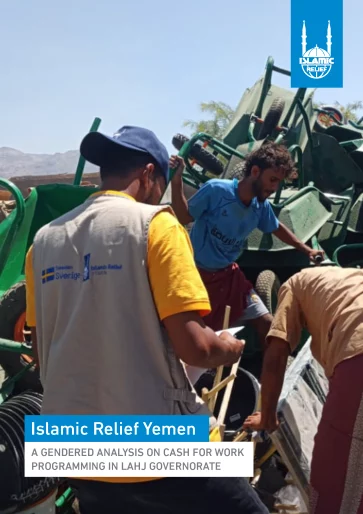
A Gendered Analysis on Cash for Work Programming in Lahj Governorate
Case Study
Cash for Work (CFW) programmes are designed to help the most vulnerable people meet their essential and basic needs. In Yemen, CFW interventions are responding to an ever-growing proportion of the Yemeni population that are in need of humanitarian assistance. Working with communities in the targeted areas of Hudayda and Lahj, the Swedish International Development Cooperation Agency SIDA-funded...
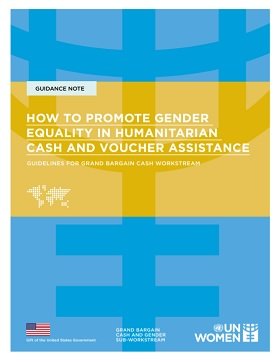
How to Promote Gender Equality in Humanitarian Cash and Voucher Assistance
Guidelines and Tools
The use of cash and voucher assistance (CVA) in humanitarian action is increasing rapidly.
With this rise, there is also growing demand by stakeholders to ensure CVA is more gender-responsive, addressing gender gaps and moving towards greater gender equality.
Gender-responsive CVA, which recognizes existing disparities and addresses the needs of all crisis-affected people equally, has the...
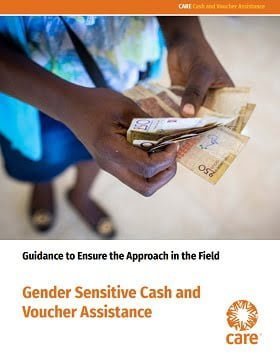
Gender-Sensitive Cash and Voucher Assistance: Guidance to ensure the approach in the field
Guidelines and Tools
This guidance builds on CARE’s ambition-via practice, research, evidence on CVA–and aims to support the application of gender sensitive CVA throughout the project cycle and at the response level. It is divided into two sections: – Part A: ‘What has been learned about gender sensitive CVA?,’ briefly explains the recommendations that came from the research. – Part B: ‘How do we...

Enablers and Gaps: Gender Equality, Gender-Based Violence Response and Mitigation in Cash and Voucher Assistance at Response levels: analysis on three case studies
Report
The Gender and Cash Sub-Workstream identified three case studies that illustrate how Cash Working Groups, GBV Sub-Clusters, gender focal points (e.g. Gender in Humanitarian Action Working groups at country and regional level) and humanitarian partnerships can enable meaningful and wider engagement on gender equity and GBV response in CVA. The case studies all show different aspects of linking...

How to mitigate gender-based violence (GBV) risks in cash and voucher assistance (CVA)
Video
Cash and voucher assistance (CVA) is an important tool to help individuals affected by crises get back on their feet. But just like any other form of assistance, it is vital to ensure that it does not fuel tensions in the household or in the community and that it does not create new risks for women and girls. Fortunately, there are a variety of ways that cash actors can work to mitigate risks...

Inclusive Information Systems for Social Protection: Intentionally Integrating Gender and Disability
Policy paper
Digital information systems serving the social protection sector, and especially social assistance, are increasingly prominent and will continue to be, as is the case within all other sectors. “Why? Because the ability of a country to care for its people and respond to their lifecycle needs depends on its ability to identify those who are in need, enroll them, provide tailored benefits and...
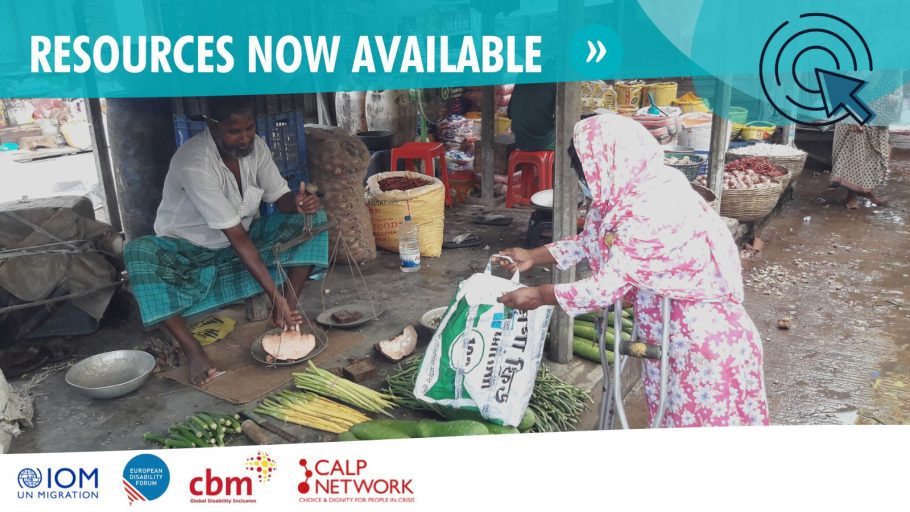
Mainstreaming disability inclusion into humanitarian CVA
Presentation
What is a rights-based approach to disability? How can disability inclusion be mainstreamed to ensure more inclusive and effective CVA humanitarian responses? To answer these key questions, CALP, CBM Global, European Disability Forum and International Organization for Migration (IOM), came together to organize the webinar “Mainstreaming disability inclusion into humanitarian CVA”, with the...
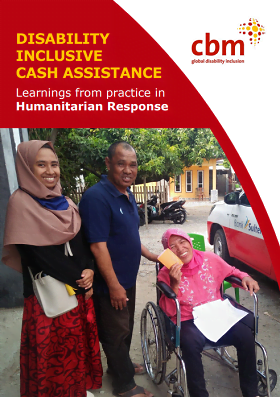
Disability Inclusive Cash Assistance: Learnings from Practice in Humanitarian Response
Guidelines and Tools
This case study collection describes lessons learned from seven inclusive humanitarian cash transfer projects implemented from 2015 – 2020 in Niger, Zimbabwe, Pakistan, Bangladesh, Philippines, and Indonesia, and five ongoing projects from the 2020 Covid-19 pandemic responses. This good practice collection aims to benefit both humanitarian practitioners engaged in Cash Based Interventions...
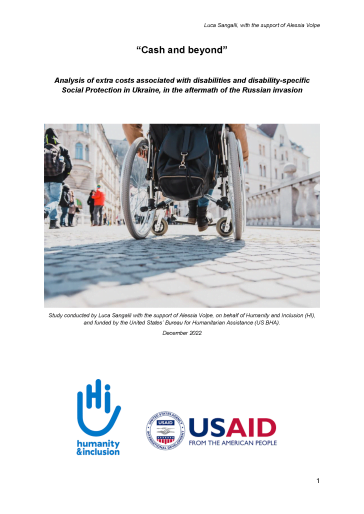
Cash and beyond – Analysis of extra costs associated with disabilities and disability-specific social protection in Ukraine, in the aftermath of the Russian invasion
Report
Following the escalation of the conflict in Ukraine in February 2022 and the consequent humanitarian crisis, the country has experienced active fighting and massive displacement, both within and outside its borders. Persons with disabilities and older persons have been facing particularly harsh effects, especially for those with more severe forms of disabilities, who encountered challenges in...
Thematic lead
Latest
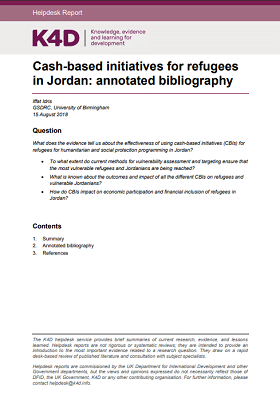
Cash-Based Initiatives for Refugees in Jordan: Annotated Bibliography
Report
The available literature tells us little about the effectiveness of targeting of cash-based initiatives (CBIs) for refugees in Jordan. However, it suggests there are positive impacts on food security for refugees, their ability to pay for rent and utilities and their psycho-social well-being, as well as...
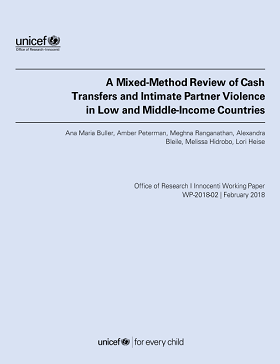
A mixed-method review of cash transfers and intimate partner violence in low and middle-income countries
Report
There is increasing evidence that cash transfer (CT) programs decrease intimate partner violence (IPV); however, little is known about how CTs achieve this impact. We conducted a mixed method review of studies in low- and middle-income countries. Fourteen quantitative and nine qualitative studies met our...
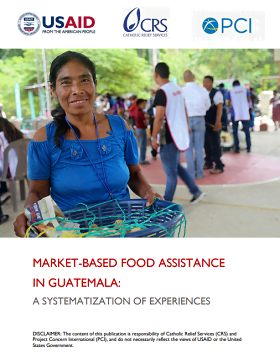
Market-based Food Assistance in Guatemala: A Systematization of Experiences
Guidelines and Tools
In April 2017, at the request of the United States Agency for International Development’s (USAID) Office of Food for Peace (FFP) in Guatemala, Catholic Relief Services (CRS) and Project Concern International (PCI) designed a process to gather and synthesize the experiences of food assistance...

Mainstreaming Gender-Based Violence Considerations in Cash-Based Interventions: A Case Study from Lower Juba, Somalia
Report
This case study provides an overview of assessment and monitoring activities
conducted by the Women’s Refugee Commission and Adeso to mainstream GBV considerations within Adeso’s CBI in Lower Juba.
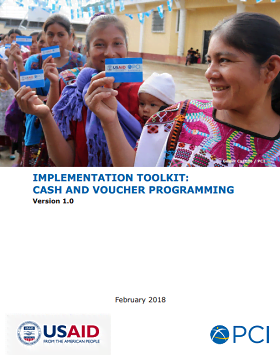
Implementation Toolkit: Cash and Voucher Programming
Guidelines and Tools
This set of tools developed by PCI seeks to harmonize language and approaches for use by teams involved in the design and implementation of cash transfer programs and is not intended to be a complete guide for design and implementation. The tool box focuses on the crucial steps within the program cycle of...

Mainstreaming Gender-Based Violence Considerations in Cash-Based Interventions: A Case Study from Zinder, Niger
Report
This case study provides an overview of assessment and monitoring activities undertaken by the Women’s Refugee Commission and Save the Children to mainstream gender-based violence (GBV) considerations in Save the Children’s cash-based intervention (CBIs) in Zinder. Key findings, learning and...

Collected Papers on Gender and Cash Transfer Programmes in Humanitarian Contexts
Report
Existing gender inequalities mean that disasters and conflicts impact women, men, girls and boys differently. Cash based assistance is one of the most significant developments in humanitarian assistance in recent years. But the relationship between gender and cash based assistance in humanitarian contexts...
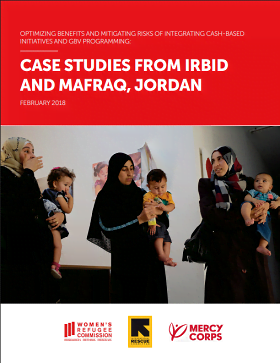
Optimizing Benefits and Mitigating Risks of Integrating Cash-Based Initiatives and GBV Programming: Case Studies from Irbid and Mafraq, Jordan
Report
This case study provides an overview of assessment and monitoring activities
conducted by Mercy Corps and the International Rescue Committee in partnership with the Women’s Commission to:
a. mainstream gender-based violence (GBV) considerations in cash-based interventions
b. utilize cash within a GBV...
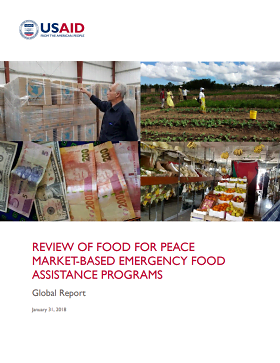
Review of Food for Peace Market-Based Emergency Food Assistance Programs Global Report
Report
Efficient and effective use of humanitarian funds is critical to meet the emergency needs of as many people as possible, especially as emergencies in developing countries have become more numerous, complex, and protracted. The United States Agency for International Development (USAID) Office of Food for...
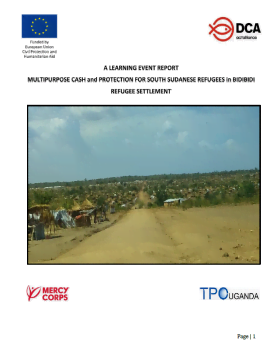
Multi-purpose Cash and Protection for South Sudanese Refugees in Bidibidi Refugee Settlement: A Learning Event Report
Report
This paper will present evidence on how cash transfers empowers conflict affected populations. The evidence is based on two projects implemented by DCA in Bidibidi Refugee Settlement in Uganda. Furthermore, the paper present evidence on how the two projects successfully linked cash and protection. 14, 520...

Review of Food for Peace Market-Based Emergency Food Assistance Programs: Democratic Republic of Congo Case Study Report
Report
The Democratic Republic of Congo (DRC) case illustrates the complexity and diversity of contexts within which program design and implementation occurs. It highlights the need for provincial-scale assessments, local market monitoring, and flexibility to pivot to different modalities depending on changing...
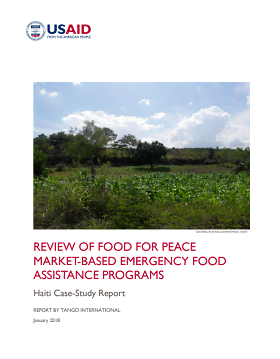
Review of Food for Peace Market-Based Emergency Food Assistance Programs: Haiti Case-Study Report
Report
Haiti is a very low-income country with a degraded ecological setting that faces repeated threats from multiple hazards. It is an excellent example of Food for Peace (FFP) linking emergency and development funding through the Kore Lavi Title II program that serves as a model for the national social...
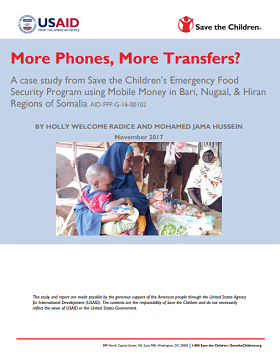
More Phones, More Transfers? A case study from Save the Children’s Emergency Food Security Program using Mobile Money in Bari, Nugaal, & Hiran Regions of Somalia
Report
In 2016-2017, with funding from USAID/FFP, Save the Children implemented a project targeting over 10,000HH the Bari, Nugaal, and Hiran regions of Somalia with monthly cash transfers using Mobile Money a partnership with Golis and Hormuud. The project sought to improve the food security situation in the...

Final Evaluation of the DiRECT Response Emergency Cash Transfer Programme in Zambia
Report
In the past two years (2015 and 2016), Zambia experienced relatively harsh climatic conditions characterised by disruptive rains and the negative impact of El Nino weather patterns. Districts in the southern and western regions of the country were most affected. Many farmers in the affected regions were...
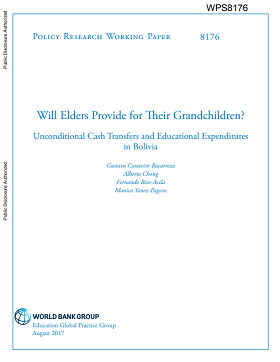
Will Elders Provide for Their Grandchildren? Unconditional Cash Transfers and Educational Expenditures in Bolivia
Report
This paper takes advantage of repeated cross-section household surveys and a sharp discontinuity created by the introduction of an unconditional cash transfers to elders.The paper evaluates the impact of these cash transfers on the educational expenditures for children within a household. The analysis...

Early Lessons Learnt from Cash Transfer Interventions in Post Matthew Haiti
Report
This technical report has twofold purposes, firstly to describe the main international evidence on cash transfer programing pertinent for the Haitian post Matthew emergency context; and secondly, to document the main lessons that can be learnt from the UNDP post Matthew cash transfer intervention. The...

Electronic Transfers in Humanitarian Assistance and Uptake of Financial Services
Report
The Electronic Cash Transfer Learning Action Network (ELAN) undertook case studies on humanitarian electronic transfer (‘e-transfer’) projects in Ethiopia, Zimbabwe and Bangladesh. The case studies examine the extent to which: recipients used digital financial services (e.g. money transfers, savings,...
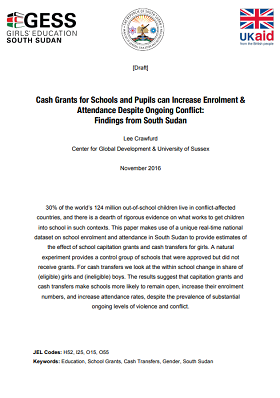
Cash Grants for Schools and Pupils can Increase Enrolment & Attendance Despite Ongoing Conflict: Findings from South Sudan
Report
This paper makes use of a unique, real-time national dataset on school enrolment and attendance in South Sudan to provide estimates of the effect of school capitation grants and cash transfers for girls.

Policy Briefing: Electronic Transfers in Humanitarian Assistance and Uptake of Financial Services
Report
The Electronic Cash Transfer Learning Action Network (ELAN) undertook case studies on humanitarian electronic transfer (‘e-transfer’) projects in Ethiopia, Zimbabwe and Bangladesh. The case studies examine the extent to which: recipients used digital financial services (e.g. money transfers, savings,...
The effect of financial aid from UK Aid Girls’ Education South Sudan programme and EU IMPACT programme to education in South Sudan in 2017
Report
This paper is an update to the previous Girls’ Education South Sudan working paper that looked at the effect of financial interventions (capitation grants and girl’s cash transfers) by Girls’ Education South Sudan, a collaboration of UK Aid and the Ministry of General Education and Instruction,...



